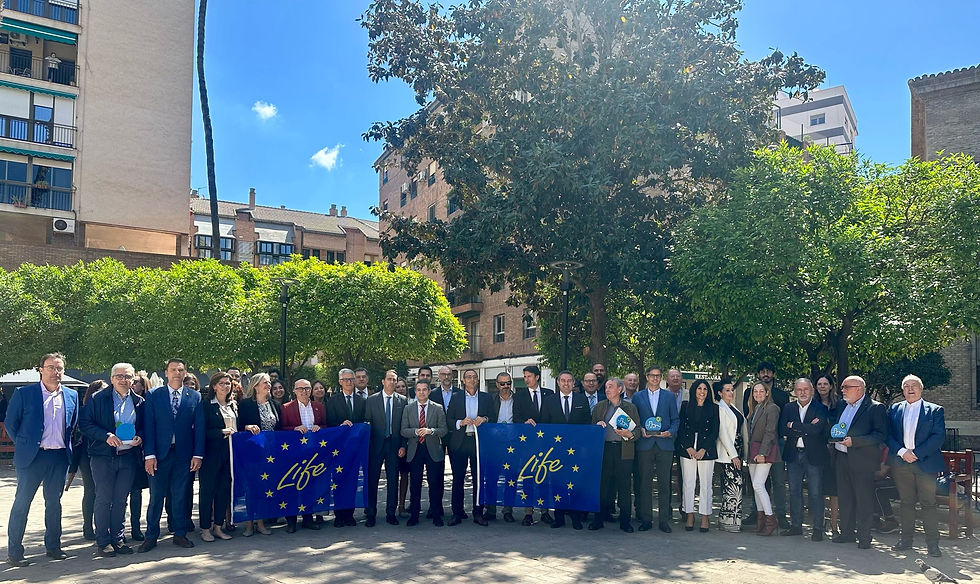LIFE City AdaP3 celebrates the last meeting after 4 years of intense work to achieve local adaptation to climate change
- LIFE CITYADAP3
- Sep 26, 2024
- 3 min read
The City Council of Molina de Segura has been the partner in charge of receiving the partnership of this project.
The meeting was attended by Raquel Navarrete, representative of Cinea, in charge of monitoring the project, and Mirjam Witschke, monitoring advisor of the European Commission.
The project for local adaptation to climate change, which involves the municipalities of Alcantarilla, Lorquí, Molina de Segura, the Italian Reggio Emilia, accompanied by the Chair of CSR at the University of Murcia, Eurovértice and the Federation of Municipalities of the Region of Murcia, the latter, as leader of this initiative, has held its last meeting just two weeks before the date set for the end of the project.
The partners of LIFE CityAdaP3 have reported on the results of the pilot actions, as well as the problems they have encountered when implementing them, and the learning acquired throughout this time. A project with numerous actions, beyond the works carried out. Training courses, citizen surveys, communication campaigns, agreements with local companies, meetings with the social fabric of the municipalities, exchanges with other projects at regional, national and European level, visits to schools and institutes, presentation of awards, and many other activities that have helped a team of more than 20 people to make progress in adapting to climate change.

The results
Alcantarilla has succeeded in building a pedestrian walkway made of modular concrete paving with a high drainage capacity. The cycling platform incorporates floodable flowerbeds with native species and wooden structures to reduce the heat island effect. The porous concrete of the platform has demonstrated its ability to withstand rainfall, with a high drying speed, making it more resilient. Climbing plants have been placed next to the wooden structures to increase the shaded area.
The municipality of Lorquí has rehabilitated the cave house ‘Las Trillizas’ by means of an innovative, economical and easy to replicate solution, as well as the refurbishment of the Cuesta del Catecismo street, replacing concrete walls with gabion walls and sprayed cement on slopes with geocells and native plants, and the refurbishment of the Cabezo de la Ermita viewpoint and its accesses. The temperature in the cave house remains stable throughout the year, proving to be a house adapted to the climate and efficient in cooling. The re-naturalisation of the Cuesta del Catecismo street has proven to mitigate the extreme temperatures in summer.
Molina de Segura, the third municipality in the Region of Murcia to take part in this LIFE project, has reforested the Nelson Mandela Park with native, better adapted species and has established sustainable urban drainage systems (ditches and infiltration wells) to reduce the peak flow of heavy rainfall. In addition, two innovative projects have been drawn up, on the one hand an Urban Green Path, shaded and tree-lined, with plant species adapted to the area, and which is being implemented in part as part of the City Council's Mobility Plan.
The Italian city of Reggio Emilia has created climate-friendly parks, consisting of urban afforestation works in 4 parks to combat heat islands and ‘bring nature back to the city’ with the experimental introduction of ‘Miyawaki’ micro-forests, field hedges, polyphytic meadows, a semi-humid zone and shading of the most used areas, defining a new adaptive park model, replicable at local and European level.
The collaboration of companies
The public-private partnership (PPP) model has undoubtedly been the innovative and differentiating factor of the project, as it is thanks to local companies that the local councils have been able to implement the pilot actions.
The project had to meet the challenge of obtaining 200,000 euros in funding from companies located in the participating municipalities.
Not only has this been achieved, but it has been exceeded by 10,000 euros, and 30 companies have signed the collaboration agreement through their CSR.
In addition, the project has achieved its replication objectives, tutoring 14 town councils in Spain and Italy.
























Comments